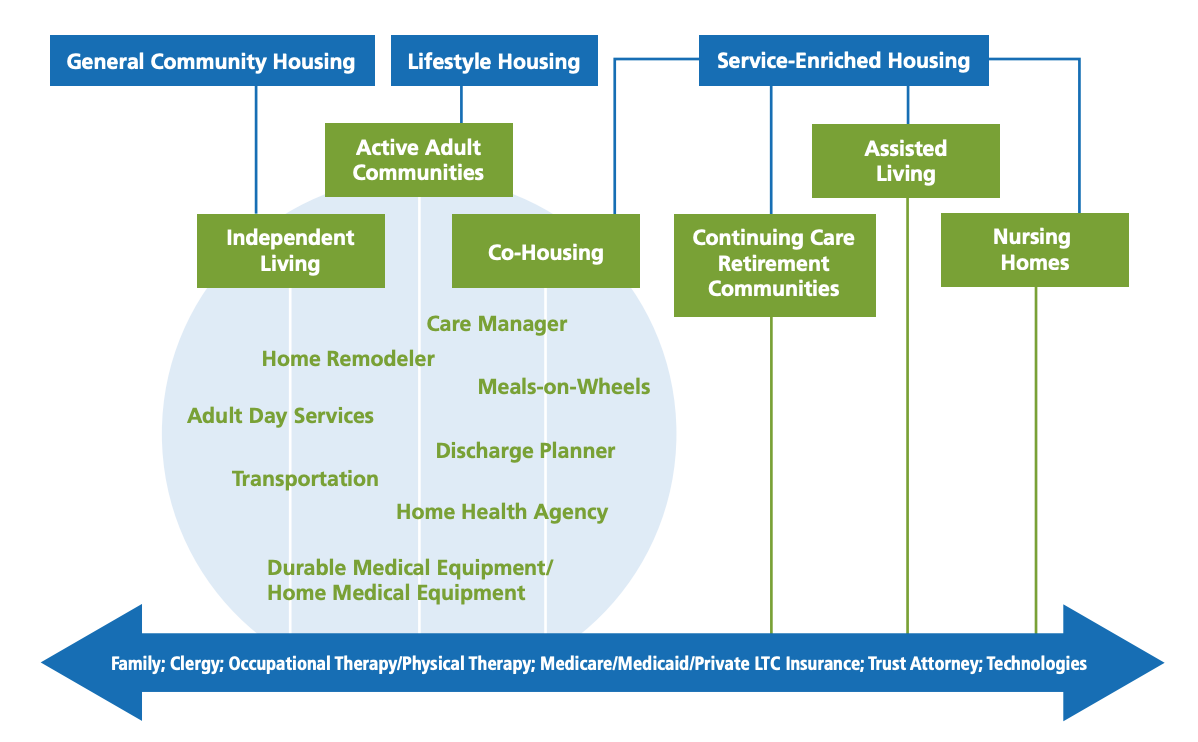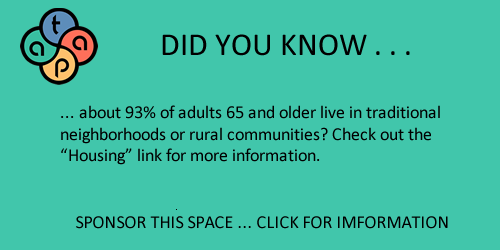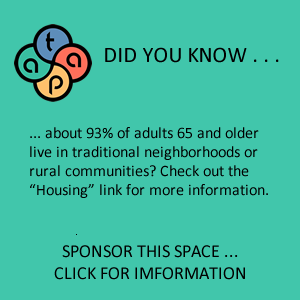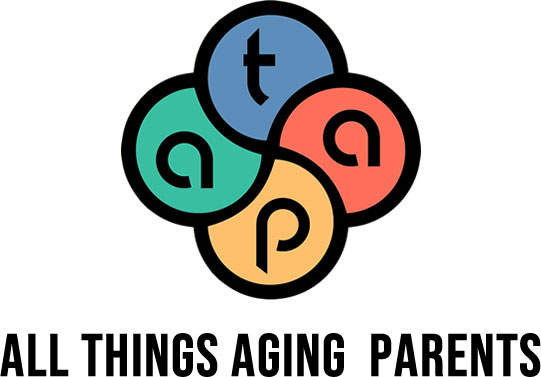Because most adults would prefer to age in place (wherever that may be), much effort is being put into enabling them to stay in their home as long as possible by providing services there. In a service enhanced facility, long term support and services are offered that meet the needs of those who are elderly, disabled, or suffer from chronic disease. But these services may also be provided in the person’s home – whether a private home, assisted living, or other residential option) – or in a community facility (such as an adult day care center). Services may include case management, housekeeping, respite care for caregivers, ongoing long-term services and supports for those with chronic illness and functional limitations, and many more. The diagram below demonstrates the breadth of housing options and how home and community-based services (HCBS) coordinate with these.

Source: The MetLife Report on Aging in Place 2.0 (MetLife MMI and Tenenbaum 2010)
There are several options to pay for many home and community-based services. Some services are available through Medicare, Medicaid, Veterans Benefits, other insurance programs, nonprofit organizations, foundations, or private pay. Across the US, Area Agencies on Aging develop and support HCBS for older adults, usually through their Aging and Disability Resource Centers.


One of the problems with HCBS is that, while services are available, they are not organized into a well-managed, systematic whole. There is a huge need for coordination and collaboration among providers. Someone has to manage these services, which could be your job as an adult child, but this is why we start our list of services with geriatric care managers, who can help you accomplish this task.
Also known as case managers, these professionals help older adults and their families understand and manage the system of services and supports. These are generally health care professionals with a background in nursing or social work who specialize in issues regarding seniors and are trained to help by assessing the needs of a specific family, the living situation, and care needed. They help to navigate the medical system and even plan and supervise care. For long distance caregivers, they can be the eyes and ears that the family relies on to know how Mom or Dad is really doing, not just what you hear through a phone conversation.
These professionals can assess your parents’ living situation and recommend changes, or even suggest that they need to move to a facility. If your parents do live in a facility, the care manager can be their advocate with the management, if necessary, or drop by at odd hours to be sure the care is up to par. Your care manager can help with medical needs by attending doctor appointments and ensuring that the orders are carried out. They can help to manage and coordinate home and community-based services, and even refer you to some that you may not be aware of.
Unfortunately, geriatric care managers are usually not covered under insurance (including Medicare and Medicaid), but it is quite likely that the money you spend up front in getting a plan and strategy in place will be recouped by not trying so many dead-end options or hasty decisions.
Most Area Agencies on Aging have links to affordable transportation for seniors who no longer drive. Transportation may be provided for medical visits, grocery store trips, visiting friends, or other needs. Local senior centers may have a list of transportation options.
Lyft is another on-demand mode of transportation but requires a level of technical savvy to use the app on a smartphone. The cost for this service is usually less than a taxi.
GOGOGrandparent is like Lyft but is a concierge service accessed by telephone (not an app) that offers additional perks like family updates when your parent is using the service. It also provides the family with the phone number of the driver. Cost for this service is about the same as Lyft, but with an additional charge for the concierge service (about $0.27 per minute).
ITNAmerica is the only national senior transportation network, with affiliates working in 13 communities across 12 states, from Maine to Florida to California. Pricing for this service depends on the network.
The list of in-home services is long and varied, from personal care to housekeeping to nursing services.
Home Care Agencies provide workers to do things like light housekeeping, meal preparation, companionship, and driving. They may provide significant help with ADLs or other tasks. Most agencies complete an initial assessment to determine what the needs of the senior are (as well as what the family requests). They also recruit, train, and supervise their employees, and reassess needs as time goes on.
Home Health Agencies provide a range of services from doctors and nurses to physical and occupational therapists, social workers, and even some housekeeping and personal care aides. Durable medical equipment (like wheelchairs or hospital beds) also falls into this category. Often these agencies are Medicare-certified so Medicare or Medicaid recipients have access to these services. (See a list of facilities in your area)
We offer one caution about home health care agencies that may have implications for taxes. Some people would prefer to hire an individual as a caregiver, rather than go through an agency. If a privately hired caregiver makes more than $600 per year, the employer (that means you or your parent) must give them a 1099 or W-2. If the caregiver is hired through an agency, there is no requirement on the part of the older adult. Also, the older adult may use the agency’s bill as proof of medical expenses for tax purposes.
Adult Day Care Centers may be an alternative for older adults who cannot remain alone in their home but do not need medical care. Some centers offer specialized services for older adults with Alzheimer’s Disease or dementia. They provide social services, meals, recreation, and transportation. Some adult day health programs offer the assistance of health care professionals with health problems, to administer medications, or even some physical therapy. (See a list of facilities in your area)
Resources:
Geriatric Care Managers:
An excellent resource to find a geriatric care manager (or a professional in any area who is also a specialist in aging and working with older adults) is to find a Certified Senior Advisor (CSA)®. These CSAs professionals have gone through intense training in how best to work with seniors. To find a CSA® specialist in your area, visit https://www.csa.us/search/custom.asp?id=3690.
- https://www.aginglifecare.org/
- https://www.caregivers.com/blog/2014/08/5-reasons-to-hire-a-geriatric-care-manager/
Transportation:


The information contained in this website is provided as a service to the Internet community, and does not constitute legal or medical advice. All Things Aging Parents works to provide quality information, but we make no claims, promises or guarantees about the accuracy, completeness, or adequacy of the information contained in or linked to this website. Information should be researched and used in light of the specific circumstances of each case. Because laws and policies are constantly hanging, nothing provided here should be used as a substitute for professional advice.
Senior care is a challenging and constantly changing topic. In order to stay relevant to your needs, ATAP welcomes your comments and suggestions. Please email us at: info@allthingsagingparents.com
All Things Aging Parents helps families during the overwhelming times of changing family dynamics and responsibilities. We don't want to add stress to this process so we offer our information free of commitment. Our sponsors make this possible. Please click here for more information about becoming a sponsor.
Privacy Policy

















